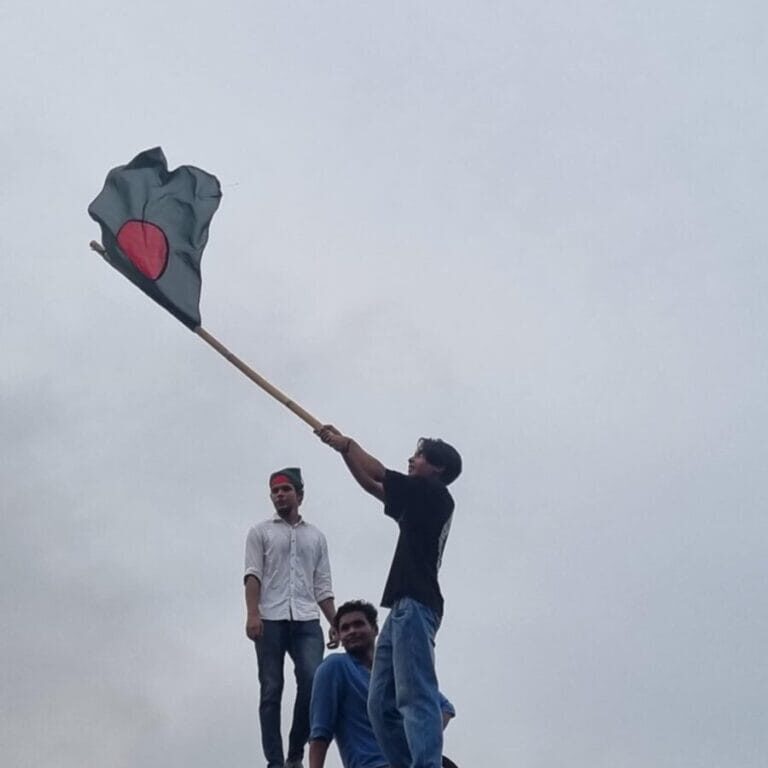
Bangladesh has had enough
The movement that ended a dictatorship
Bangladesh has had enough! The call for freedom resonated nationwide as Bangladesh protests ended a dictatorship that spanned 52 years.
The 2024 Bangladesh quota reform movement, also known as the July revolution, was more than a fight for a fair chance at government jobs for Bangladeshi university students; it was an uprising against a dictatorship that reigned in the pretence of democracy for over 15 years. With hundreds of people dead and thousands arrested during the movement, the former Prime Minister on the run and reports of severe corruption coming to light, the movement is a testament to the unwavering patriotism that the people of Bangladesh possess.
Understanding the quota reform movement
Quotas are reserved positions in the government job sector designated for marginalized and underrepresented groups of people to address social and economic disparities while promoting inclusion. One such reservation was for the families of 1971 war veterans called Freedom Fighters to showcase respect for their sacrifice.
However, after more than 50 years since the Liberation War, the Freedom Fighters’ Quota became a backdoor for the former ruling party cadres to get government jobs with minimal to non-existent merit. The Quota system was abolished in 2018 after a protest but was later reinstated by the Supreme Court. This led to peaceful protests in the capital organized by Dhaka University students. The protest was then met with violence by the government’s student wing and the police.
Law enforcement brutality, media censorship and one-point demand
On July 15., the former ruling party’s student wing, the Chhatra League, launched violent attacks on student protesters while the police targeted educational institutions in the capital. Despite the former government denying any police involvement, video evidence showed police firing live ammunition at unarmed students.
In response to the escalating chaos, the government imposed a nationwide curfew and deployed the army, using UN vehicles and shoot-on-sight orders to intimidate and kill protesters. This restricted citizens from being out on the streets for several hours of the day.
Amidst the protest, the former ruling party, Bangladesh Awami League, initiated a total internet shutdown, effectively isolating Bangladeshi residents from the outside world. As law enforcement brutally suppressed student protesters—running them over with cars, shooting at them with live ammunition, and even using helicopters for aerial attacks—the government sought to stifle international criticism. To further minimize international coverage of the events, law enforcement officials began checking cell phones and social media to get rid of any evidence of the regime’s oppressive tactics. Police raids became common, with unlawful arrests of minors who were then prosecuted as adults, a cruel tactic to conceal mass detentions and killings.
Soon the quota reform movement became the voice of justice, seeking the resignation of Prime Minister Sheikh Hasina for her use of mass violence and force to remain in a position of power.
Hasina on the run and an interim government
After continued violence, international scrutiny and a demand for resignation by the entire nation, Hasina resigned as the prime minister and fled to India after protesters marched into her residence.
After news of her resignation spread, the country burst into a chorus of celebration. The president of Bangladesh, Mohammed Shahabuddin, dissolved the parliament with a new interim government in place, headed by Muhammad Yunus, a Nobel Peace Prize-winning economist. Chosen by the student demonstrator leaders, Yunus has since created a ministry that puts its focus on re-establishing the country as a democratic nation that works for the collective people of Bangladesh.
Undeniable corruption and brutal torture
A recent investigation sheds light on the corruption that took place during Hasina’s reign.
The Anti-Corruption Commission has initiated probes into corruption allegations against 41 members of Hasina’s government who served as ministers and lawmakers. According to the Global Defence Corporation, the former prime minister had embezzled $5 billion from the Rooppur Nuclear Power Plant, which was aiming to deliver up to 20 per cent of the nation’s electricity demands.
Further investigation into the prime minister led the public to the discovery of Aynaghar, a secret detention facility that served as a torture chamber for the victims of enforced disappearances by the then government. These victims were people of different ages and political and social backgrounds, but they were all named as anti-government elements. Aynaghar, which translates to the ‘house of mirrors,’ enforced complete isolation, along with mental and physical torture of the victims.
A new dawn
The Bangladesh quota movement transcended its initial aim of reforming job reservations, evolving into a powerful uprising against a repressive regime that prioritized its interests over the welfare of its citizens.
As the nation continues to grapple with the devastating impact of government-sanctioned violence and widespread human rights abuses, the call for justice has become a rallying cry for all who yearn for change. Prime Minister Hasina’s resignation reflects a profound discontent with the former government that has lost its legitimacy through corruption, censorship, and oppression. The unwavering quest for justice serves as a testament to the spirit of determination among the citizens of Bangladesh, resembling that of the people during 1971’s liberation war. The time for change is now. With ongoing efforts for reform and democracy through unity, the people of Bangladesh continue to show their love for their country, a country that is free once again.






